37 Nights | ATLANTIC CONNOISSEUR
You will visit the following 23 places:
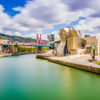
Bilbao
Bilbao is a municipality and city in Spain, a major city in the province of Biscay in the autonomous community of the Basque Country. It is the main urban area in what is defined as the Greater Basque region. Situated in the north-central part of Spain, its main urban core is surrounded by two small mountain ranges. After its foundation in the early 14th century by Diego López V de Haro, head of the powerful Haro family, the city was a commercial hub of the Basque Country that enjoyed significant importance in Green Spain. This was due to its port activity based on the export of iron extracted from the Biscayan quarries. Throughout the nineteenth century and the beginning of the twentieth, Bilbao experienced heavy industrialisation, making it the centre of the second-most industrialised region of Spain. Today, Bilbao is a vigorous service city that is experiencing an ongoing social, economic, and aesthetic revitalisation process, started by the iconic Bilbao Guggenheim Museum, and continued by infrastructure investments, such as the airport terminal, the rapid transit system, the tram line, the Alhóndiga, and the currently under development Abandoibarra and Zorrozaurre renewal projects. Bilbao is also home to football club Athletic Club de Bilbao, a significant symbol for Basque nationalism due to its promotion of Basque players and one of the most successful clubs in Spanish football history.

New Brunswick
New Brunswick is one of the Atlantic Provinces of Canada, and the only constitutionally bilingual province in the country. The provincial capital is Fredericton. New Brunswick is a relatively sparsely populated province, with considerable forests forming the main body. The core of the province is virtually uninhabited, with the population very focused in the Western part of the province as well as the Eastern and Southern coastlines. The province's name comes from the English and French translation for the city of Braunschweig in Lower Saxony, northern Germany, the ancestral home of the Hanoverian King George III of the United Kingdom.

Belfast
Belfast (meaning: "mouth of the sandbanks") is the capital and largest city of Northern Ireland, the second-largest city in Ireland after Dublin, and is situated around the River Lagan, which runs through the city. It is a port city known as the birthplace of the RMS Titanic, and for its political murals, documenting the ‘Troubles’ of the 20th century. Today, Belfast remains a centre for industry, as well as the arts, higher education, business, and law, and is the economic engine of Northern Ireland. The city suffered greatly during the period of conflict called "the Troubles", but latterly has undergone a sustained period of calm, free from the intense political violence of former years, and substantial economic and commercial growth. Additionally, Belfast city centre has undergone considerable expansion and regeneration in recent years, notably around Victoria Square.

Pisa
Pisa is a city in central Italy's Tuscany region best known for its iconic Leaning Tower (the bell tower of the city's cathedral). Although Pisa is known worldwide for its leaning tower, the city contains more than 20 other historic churches, several medieval palaces and various bridges across the River Arno. Much of the city's architecture was financed from its history as one of the Italian maritime republics. The city is also home of the University of Pisa, which has a history going back to the 12th century and also has the mythic Napoleonic Scuola Normale Superiore di Pisa and Sant'Anna School of Advanced Studies as the best sanctioned Superior Graduate Schools in Italy.
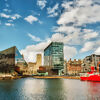
Admiral Street Police Station (Merseyside Police)
Liverpool is an important city of Merseyside, England. It was founded as a borough in 1207 and was granted city status in 1880. It is a major city famed for culture, football teams, The Beatles and buzzing nightlife. It lies within the historic county boundaries of Lancashire. It is also a large, vibrant city with great cultural heritage and was awarded the title of European Capital of Culture 2008, with the famous Pier Head Waterfront being a UNESCO World Heritage site since 2004.
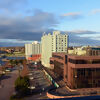
Sydney
Sydney is a Canadian urban community in the province of Nova Scotia. It is situated on the east coast of Cape Breton Island and is administratively part of the Cape Breton Regional Municipality. Sydney was incorporated in 1904 and dissolved on August 1, 1995, when it was merged into the regional municipality. It is the largest urban centre on Cape Breton Island. Together with Sydney Mines, North Sydney, New Waterford and Glace Bay it forms the Industrial Cape Breton region. Sydney is located on east bank of the Sydney River where it discharges into South Arm of Sydney Harbour.

Halifax
Halifax, legally known as the Halifax Regional Municipality (HRM), is the capital of the province of Nova Scotia, Canada. It is a major economic centre in Atlantic Canada with a large concentration of government services and private sector companies. Major employers and economic generators include the Department of National Defence, Dalhousie University,Saint Mary's University, the Halifax Shipyard, various levels of government, and the Port of Halifax. Agriculture, fishing, mining, forestry and natural gas extraction are major resource industries found in the rural areas of the municipality. Halifax was ranked as the fourth best place to live in Canada for 2012, placed first on a list of "large cities by quality of life" and placed second in a list of "large cities of the future''. Additionally, Halifax has consistently placed in the top 10 for business friendliness of North and South American cities. Waterfront warehouses known as the Historic Properties recall Halifax’s days as a trading hub for privateers, notably during the War of 1812.

Southampton
Southampton is the largest city in the county of Hampshire on the south coast of England, and is situated 120 kilometres (75 mi) south-west of London and 30 kilometres (19 mi) north-west of Portsmouth. Southampton is a major port and the closest city to the New Forest. It lies at the northernmost point of Southampton Water at the confluence of the River Test and River Itchen, with the River Hamble joining to the south of the urban area. The local authority is Southampton City Council, which is a unitary authority. Just over a quarter of the jobs available in the city are in the health and education sector. A further 19 per cent are property and other business and the third largest sector is wholesale and retail, which accounts for 16.2 percent. Between 1995 and 2004, the number of jobs in Southampton has increased by 18.5 per cent. Southampton has always been a port, and the docks have long been a major employer in the city. In particular, it is a port for cruise ships; its heyday was the first half of the 20th century, and in particular the inter-war years, when it handled almost half the passenger traffic of the UK. Today it remains home to luxury cruise ships, as well as being the largest freight port on the Channel coast and fourth largest UK port by tonnage, with several container terminals. Unlike some other ports, such as Liverpool, London, and Bristol, where industry and docks have largely moved out of the city centres leaving room for redevelopment, Southampton retains much of its inner-city industry.

New York City
New York City is the most populous city in the United States and the center of the New York metropolitan area. The city has a significant impact on global commerce, finance, media, culture, art, fashion, research, education, and entertainment. As host of the United Nations Headquarters, it is also an important center for international affairs. The city is often referred to as ''New York City'' or the ''City of New York'', to distinguish it from the state of New York, of which it is a part. Located on a large natural harbor on the Atlantic coast of the Northeastern United States, New York City consists of five boroughs: The Bronx, Brooklyn, Manhattan, Queens, and Staten Island.

St. John's
St. John's is the capital and largest city in Newfoundland and Labrador, Canada. St. John's was incorporated as a city in 1888, yet is considered by some to be the oldest English-founded city in North America. Situated on the eastern tip of the Avalon Peninsula on the island of Newfoundland, it is one of the world's top ten oceanside destinations. Its name has been attributed to the feast day of John the Baptist, when John Cabot was believed to have sailed into the harbour in 1497, and also to a Basque fishing town with the same name.
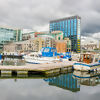
Dublin South
Dublin is the largest and capital city of Ireland. The English name is derived from the Irish name Dubh Linn, meaning "black pool". It is a primate city with an urban population of over 1 million, containing almost 25% of the country's population. Dublin is situated near the midpoint of Ireland's east coast, at the mouth of the River Liffey, and at the centre of the Dublin Region. The city is listed by the Globalization and World Cities Research Network (GaWC) as a global city, with a ranking of "Alpha-", placing it among the top thirty cities in the world. It is a historical and contemporary centre for education, the arts, administration, economy and industry.
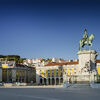
Lisbon
The capital of Portugal, Lisbon (Portuguese: Lisboa) has experienced a renaissance in recent years, with a contemporary culture that is alive and thriving and making its mark in today's Europe. Perched on the edge of the Atlantic Ocean, Lisbon is one of the rare Western European cities that faces the ocean and uses water as an element that defines the city. Lisbon enchants travellers with its white-bleached limestone buildings, intimate alleyways, and an easy-going charm that makes it a popular year-round destination.

Bordeaux
Bordeaux is a port city on the Garonne River in southwest France, with an estimated (2008) population of 250,082. The Bordeaux-Arcachon-Libourne metropolitan area, has a population of 1,010,000 and constitutes the sixth-largest urban area in France. It is the capital of the Aquitaine region, as well as the prefecture of the Gironde department. Its inhabitants are called Bordelais. Bordeaux is the world's major wine industry capital. It is home to the world's main wine fair, Vinexpo, while the wine economy in the metro area moves 14.5 billion euros each year. Bordeaux wine has been produced in the region since the eighth century. The historic part of the city is on the UNESCO World Heritage List as "an outstanding urban and architectural ensemble" of the 18th century.

Porto
Porto (also known as Oporto in English), is the second largest city in Portugal after Lisbon and one of the major urban areas of the Iberian Peninsula. The urban area of Porto, which extends beyond the administrative limits of the city, has a population of 1.4 million (2011) in an area of 389 km2 (150 sq mi), making it the second-largest urban area in Portugal. Located along the Douro river estuary in Northern Portugal, Porto is one of the oldest European centres, and its historical core was proclaimed a World Heritage Site by UNESCO in 1996. The western part of its urban area extends to the coastline of the Atlantic Ocean. Its settlement dates back many centuries, when it was an outpost of the Roman Empire. One of Portugal's internationally famous exports, port wine, is named for Porto, since the metropolitan area, and in particular the caves of Vila Nova de Gaia, were responsible for the packaging, transport and export of the fortified wine. In 2014, Porto was elected The Best European Destination by the Best European Destinations Agency.
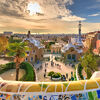
Barcelona
Barcelona – Spain's enchanting capital, second largest and most populous city. It is a huge city that vibrates with life, and there’s certainly not another city in the country to touch it for its sheer style, looks or energy. It is one of the world's leading tourist, economic, trade fair and cultural centers, and its influence in commerce, education, entertainment, media, fashion, science, and the arts all contribute to its status as one of the world's major global cities. Barcelona is home to masterpieces of many great architects – the most famous of which is Antoni Gaudí.

Valencia
Valencia is the most populous city of the Autonomous Community of Valencia and the third largest city in Spain, with a population of 809,267 in 2010. It is the 15th-most populous municipality in the European Union. It is integrated into an industrial area on the Costa del Azahar. Its historic centre is one of the largest in Spain, with approximately 169 hectares; this heritage of ancient monuments, views and cultural attractions makes Valencia one of the country's most popular tourist destinations!

Miami
Miami is a major city located on the Atlantic coast in southeastern Florida and the county seat of Miami-Dade County, the most populous county in Florida and the eighth-most populous county in the United States with a population of 2,500,625. The 42nd largest city in the United States, with a population of 433,136, it is the principal, central, and most populous city of the South {Florida} metropolitan area, the most populous metropolis in the Southeastern United States. According to the US Census Bureau, Miami's metro area is the seventh most populous in the United States, with an estimated population of 5,547,051 in 2009.

Monte Carlo
Monte Carlo, officially refers to an administrative area of the Principality of Monaco, specifically the ward of Monte Carlo/Spélugues, where the Monte Carlo Casino is located. Monaco has four traditional quarters - from west to east they are: Fontvieille (the newest), Monaco-Ville (the oldest), La Condamine, and Monte Carlo. Monte Carlo (literally "Mount Charles") is situated on a prominent escarpment at the base of the Maritime Alps along the French Riviera. Near the western end of the quarter is the world-famous Place du Casino, the gambling center which has made Monte Carlo "an international byword for the extravagant display and reckless dispersal of wealth". It is also the location of the Hôtel de Paris, the Café de Paris, and the Salle Garnier (the casino theatre which is the home of the Opéra de Monte-Carlo).

Cadiz
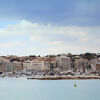
Civitavecchia
Civitavecchia is a town and comune of the Metropolitan City of Rome in the central Italian region of Lazio. A sea port on the Tyrrhenian Sea, the name ''Civitavecchia'' means "ancient town". The modern city was built over a pre-existing Etruscan settlement. The massive Forte Michelangelo was first commissioned from Donato Bramante by Pope Julius II, to defend the port of Rome. The upper part of the "maschio" tower, however, was designed by Michelangelo, whose name is generally applied to the fortress. North of the city at Ficoncella are the Terme Taurine baths frequented by Romans and still popular with the Civitavecchiesi. The modern name stems from the common fig plants among the various pools. And also next to the town is the location of the cruise ship docks. All major cruise lines start and end their cruises at this location, and others stop for shore excursion days that allow guests to see Rome and Vatican sights, which are ninety minutes away.

A Coruña

An Cobh










